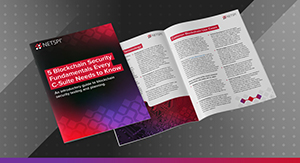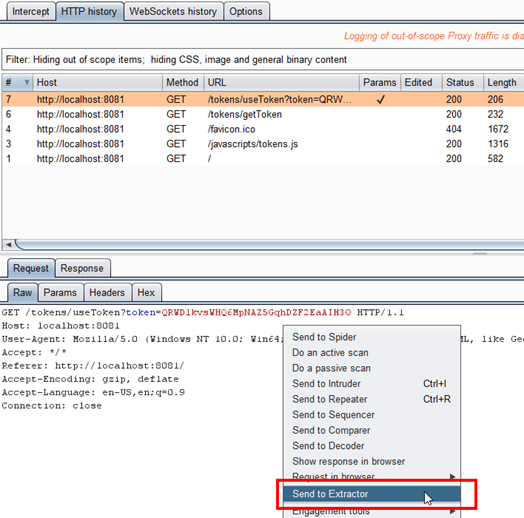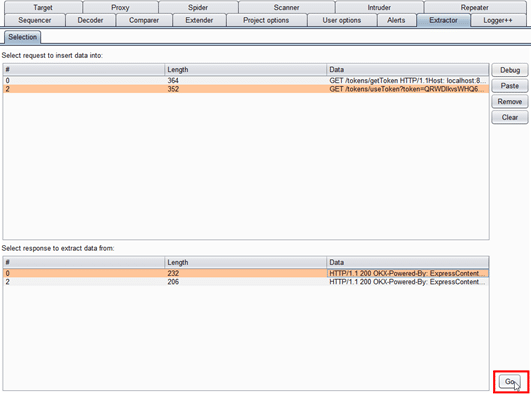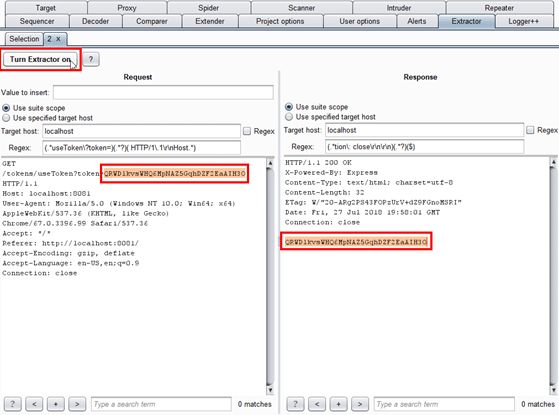Will Strei
Will graduated from the University of Minnesota with a BS in Computer Science with an emphasis in computer security. He has been with NetSPI for about two years now, and focuses primarily on web application penetration testing and related tool development. Since joining NetSPI, he has performed penetration tests for top US banks, healthcare software providers, and some of the leading cloud providers.
More by Will Strei
WP_Query Object
(
[query] => Array
(
[post_type] => Array
(
[0] => post
[1] => webinars
)
[posts_per_page] => -1
[post_status] => publish
[meta_query] => Array
(
[relation] => OR
[0] => Array
(
[key] => new_authors
[value] => "45"
[compare] => LIKE
)
[1] => Array
(
[key] => new_presenters
[value] => "45"
[compare] => LIKE
)
)
)
[query_vars] => Array
(
[post_type] => Array
(
[0] => post
[1] => webinars
)
[posts_per_page] => -1
[post_status] => publish
[meta_query] => Array
(
[relation] => OR
[0] => Array
(
[key] => new_authors
[value] => "45"
[compare] => LIKE
)
[1] => Array
(
[key] => new_presenters
[value] => "45"
[compare] => LIKE
)
)
[error] =>
[m] =>
[p] => 0
[post_parent] =>
[subpost] =>
[subpost_id] =>
[attachment] =>
[attachment_id] => 0
[name] =>
[pagename] =>
[page_id] => 0
[second] =>
[minute] =>
[hour] =>
[day] => 0
[monthnum] => 0
[year] => 0
[w] => 0
[category_name] =>
[tag] =>
[cat] =>
[tag_id] =>
[author] =>
[author_name] =>
[feed] =>
[tb] =>
[paged] => 0
[meta_key] =>
[meta_value] =>
[preview] =>
[s] =>
[sentence] =>
[title] =>
[fields] =>
[menu_order] =>
[embed] =>
[category__in] => Array
(
)
[category__not_in] => Array
(
)
[category__and] => Array
(
)
[post__in] => Array
(
)
[post__not_in] => Array
(
)
[post_name__in] => Array
(
)
[tag__in] => Array
(
)
[tag__not_in] => Array
(
)
[tag__and] => Array
(
)
[tag_slug__in] => Array
(
)
[tag_slug__and] => Array
(
)
[post_parent__in] => Array
(
)
[post_parent__not_in] => Array
(
)
[author__in] => Array
(
)
[author__not_in] => Array
(
)
[search_columns] => Array
(
)
[ignore_sticky_posts] =>
[suppress_filters] =>
[cache_results] => 1
[update_post_term_cache] => 1
[update_menu_item_cache] =>
[lazy_load_term_meta] => 1
[update_post_meta_cache] => 1
[nopaging] => 1
[comments_per_page] => 50
[no_found_rows] =>
[order] => DESC
)
[tax_query] => WP_Tax_Query Object
(
[queries] => Array
(
)
[relation] => AND
[table_aliases:protected] => Array
(
)
[queried_terms] => Array
(
)
[primary_table] => wp_posts
[primary_id_column] => ID
)
[meta_query] => WP_Meta_Query Object
(
[queries] => Array
(
[0] => Array
(
[key] => new_authors
[value] => "45"
[compare] => LIKE
)
[1] => Array
(
[key] => new_presenters
[value] => "45"
[compare] => LIKE
)
[relation] => OR
)
[relation] => OR
[meta_table] => wp_postmeta
[meta_id_column] => post_id
[primary_table] => wp_posts
[primary_id_column] => ID
[table_aliases:protected] => Array
(
[0] => wp_postmeta
)
[clauses:protected] => Array
(
[wp_postmeta] => Array
(
[key] => new_authors
[value] => "45"
[compare] => LIKE
[compare_key] => =
[alias] => wp_postmeta
[cast] => CHAR
)
[wp_postmeta-1] => Array
(
[key] => new_presenters
[value] => "45"
[compare] => LIKE
[compare_key] => =
[alias] => wp_postmeta
[cast] => CHAR
)
)
[has_or_relation:protected] => 1
)
[date_query] =>
[request] => SELECT wp_posts.ID
FROM wp_posts INNER JOIN wp_postmeta ON ( wp_posts.ID = wp_postmeta.post_id )
WHERE 1=1 AND (
( wp_postmeta.meta_key = 'new_authors' AND wp_postmeta.meta_value LIKE '{98e970b1b36d00274557d287bbcfa5a05579a7d0787747842fd107ae14f9c5bf}\"45\"{98e970b1b36d00274557d287bbcfa5a05579a7d0787747842fd107ae14f9c5bf}' )
OR
( wp_postmeta.meta_key = 'new_presenters' AND wp_postmeta.meta_value LIKE '{98e970b1b36d00274557d287bbcfa5a05579a7d0787747842fd107ae14f9c5bf}\"45\"{98e970b1b36d00274557d287bbcfa5a05579a7d0787747842fd107ae14f9c5bf}' )
) AND wp_posts.post_type IN ('post', 'webinars') AND ((wp_posts.post_status = 'publish'))
GROUP BY wp_posts.ID
ORDER BY wp_posts.post_date DESC
[posts] => Array
(
[0] => WP_Post Object
(
[ID] => 9567
[post_author] => 45
[post_date] => 2018-08-07 07:00:44
[post_date_gmt] => 2018-08-07 07:00:44
[post_content] => The Problem With Tokens and Scanning
Burp Suite's cookie jar is an incredibly handy tool that makes a penetration tester’s life much easier in many situations. It makes for a no hassle way to reissue requests in Repeater as a different user, scan requests which were originally issued in a previous session, and other fun things. But what happens when you need to change more than just cookies? Sometimes an application requires an anti-CSRF token, an updated expiration time, or maybe a session is tracked in an Authorization header instead of cookies. Normally with Burp, this could cause a major headache and a match/replace might be used, or it could be worth struggling through setting up a macro. Both methods requiring a good amount of manual intervention.
Burp Extractor as an Easy-to-Use Solution
Burp Extractor is intended to be a pain killer for these headaches. This extension allows penetration testers to select a string to extract from responses using a regular expression-based matching mechanism, and insert that string into any request with a similar matching mechanism, effectively making a cookie jar for whatever dynamic information the tester needs.
Using Burp Extractor
If a request requires a value from a response, right click on that request and select “Send to Extractor”. Then find a response where the client receives this value from, and select “Send to Extractor”.
Go to the Extractor tab to view a Comparer-like interface, and select the request and response needed, then click “Go”.
Within the newly created tab, highlight the content of the request which needs to be replaced, and the content of the response which contains the value to be inserted. Adjust the scope as necessary, and click “Turn Extractor on”.
Once turned on, Extractor will look for occurrences of the regex listed in the request and response panels, and extract or insert data appropriately. It will also update the “Value to insert” field with the newest value extracted.
Check out the demonstration below to see an example usage of the extension, and grab the extension off GitHub! Hopefully this tool will help ease some pains when dealing with web apps that use tokens or authentication that Burp is not always well-equipped to cope with.
[caption id="" align="aligncenter" width="958"] Example usage of Burp Extractor[/caption]
[post_title] => Introducing Burp Extractor
[post_excerpt] =>
[post_status] => publish
[comment_status] => closed
[ping_status] => closed
[post_password] =>
[post_name] => introducing-burp-extractor
[to_ping] =>
[pinged] =>
[post_modified] => 2021-06-08 21:55:14
[post_modified_gmt] => 2021-06-08 21:55:14
[post_content_filtered] =>
[post_parent] => 0
[guid] => https://netspiblogdev.wpengine.com/?p=9567
[menu_order] => 589
[post_type] => post
[post_mime_type] =>
[comment_count] => 0
[filter] => raw
)
)
[post_count] => 1
[current_post] => -1
[before_loop] => 1
[in_the_loop] =>
[post] => WP_Post Object
(
[ID] => 9567
[post_author] => 45
[post_date] => 2018-08-07 07:00:44
[post_date_gmt] => 2018-08-07 07:00:44
[post_content] =>
Example usage of Burp Extractor[/caption]
[post_title] => Introducing Burp Extractor
[post_excerpt] =>
[post_status] => publish
[comment_status] => closed
[ping_status] => closed
[post_password] =>
[post_name] => introducing-burp-extractor
[to_ping] =>
[pinged] =>
[post_modified] => 2021-06-08 21:55:14
[post_modified_gmt] => 2021-06-08 21:55:14
[post_content_filtered] =>
[post_parent] => 0
[guid] => https://netspiblogdev.wpengine.com/?p=9567
[menu_order] => 589
[post_type] => post
[post_mime_type] =>
[comment_count] => 0
[filter] => raw
)
)
[post_count] => 1
[current_post] => -1
[before_loop] => 1
[in_the_loop] =>
[post] => WP_Post Object
(
[ID] => 9567
[post_author] => 45
[post_date] => 2018-08-07 07:00:44
[post_date_gmt] => 2018-08-07 07:00:44
[post_content] => The Problem With Tokens and Scanning
Burp Suite's cookie jar is an incredibly handy tool that makes a penetration tester’s life much easier in many situations. It makes for a no hassle way to reissue requests in Repeater as a different user, scan requests which were originally issued in a previous session, and other fun things. But what happens when you need to change more than just cookies? Sometimes an application requires an anti-CSRF token, an updated expiration time, or maybe a session is tracked in an Authorization header instead of cookies. Normally with Burp, this could cause a major headache and a match/replace might be used, or it could be worth struggling through setting up a macro. Both methods requiring a good amount of manual intervention.
Burp Extractor as an Easy-to-Use Solution
Burp Extractor is intended to be a pain killer for these headaches. This extension allows penetration testers to select a string to extract from responses using a regular expression-based matching mechanism, and insert that string into any request with a similar matching mechanism, effectively making a cookie jar for whatever dynamic information the tester needs.
Using Burp Extractor
If a request requires a value from a response, right click on that request and select “Send to Extractor”. Then find a response where the client receives this value from, and select “Send to Extractor”.
Go to the Extractor tab to view a Comparer-like interface, and select the request and response needed, then click “Go”.
Within the newly created tab, highlight the content of the request which needs to be replaced, and the content of the response which contains the value to be inserted. Adjust the scope as necessary, and click “Turn Extractor on”.
Once turned on, Extractor will look for occurrences of the regex listed in the request and response panels, and extract or insert data appropriately. It will also update the “Value to insert” field with the newest value extracted.
Check out the demonstration below to see an example usage of the extension, and grab the extension off GitHub! Hopefully this tool will help ease some pains when dealing with web apps that use tokens or authentication that Burp is not always well-equipped to cope with.
[caption id="" align="aligncenter" width="958"] Example usage of Burp Extractor[/caption]
[post_title] => Introducing Burp Extractor
[post_excerpt] =>
[post_status] => publish
[comment_status] => closed
[ping_status] => closed
[post_password] =>
[post_name] => introducing-burp-extractor
[to_ping] =>
[pinged] =>
[post_modified] => 2021-06-08 21:55:14
[post_modified_gmt] => 2021-06-08 21:55:14
[post_content_filtered] =>
[post_parent] => 0
[guid] => https://netspiblogdev.wpengine.com/?p=9567
[menu_order] => 589
[post_type] => post
[post_mime_type] =>
[comment_count] => 0
[filter] => raw
)
[comment_count] => 0
[current_comment] => -1
[found_posts] => 1
[max_num_pages] => 0
[max_num_comment_pages] => 0
[is_single] =>
[is_preview] =>
[is_page] =>
[is_archive] =>
[is_date] =>
[is_year] =>
[is_month] =>
[is_day] =>
[is_time] =>
[is_author] =>
[is_category] =>
[is_tag] =>
[is_tax] =>
[is_search] =>
[is_feed] =>
[is_comment_feed] =>
[is_trackback] =>
[is_home] => 1
[is_privacy_policy] =>
[is_404] =>
[is_embed] =>
[is_paged] =>
[is_admin] =>
[is_attachment] =>
[is_singular] =>
[is_robots] =>
[is_favicon] =>
[is_posts_page] =>
[is_post_type_archive] =>
[query_vars_hash:WP_Query:private] => 6f2d893656ea667bf20e966a7ef7189b
[query_vars_changed:WP_Query:private] =>
[thumbnails_cached] =>
[allow_query_attachment_by_filename:protected] =>
[stopwords:WP_Query:private] =>
[compat_fields:WP_Query:private] => Array
(
[0] => query_vars_hash
[1] => query_vars_changed
)
[compat_methods:WP_Query:private] => Array
(
[0] => init_query_flags
[1] => parse_tax_query
)
)
Example usage of Burp Extractor[/caption]
[post_title] => Introducing Burp Extractor
[post_excerpt] =>
[post_status] => publish
[comment_status] => closed
[ping_status] => closed
[post_password] =>
[post_name] => introducing-burp-extractor
[to_ping] =>
[pinged] =>
[post_modified] => 2021-06-08 21:55:14
[post_modified_gmt] => 2021-06-08 21:55:14
[post_content_filtered] =>
[post_parent] => 0
[guid] => https://netspiblogdev.wpengine.com/?p=9567
[menu_order] => 589
[post_type] => post
[post_mime_type] =>
[comment_count] => 0
[filter] => raw
)
[comment_count] => 0
[current_comment] => -1
[found_posts] => 1
[max_num_pages] => 0
[max_num_comment_pages] => 0
[is_single] =>
[is_preview] =>
[is_page] =>
[is_archive] =>
[is_date] =>
[is_year] =>
[is_month] =>
[is_day] =>
[is_time] =>
[is_author] =>
[is_category] =>
[is_tag] =>
[is_tax] =>
[is_search] =>
[is_feed] =>
[is_comment_feed] =>
[is_trackback] =>
[is_home] => 1
[is_privacy_policy] =>
[is_404] =>
[is_embed] =>
[is_paged] =>
[is_admin] =>
[is_attachment] =>
[is_singular] =>
[is_robots] =>
[is_favicon] =>
[is_posts_page] =>
[is_post_type_archive] =>
[query_vars_hash:WP_Query:private] => 6f2d893656ea667bf20e966a7ef7189b
[query_vars_changed:WP_Query:private] =>
[thumbnails_cached] =>
[allow_query_attachment_by_filename:protected] =>
[stopwords:WP_Query:private] =>
[compat_fields:WP_Query:private] => Array
(
[0] => query_vars_hash
[1] => query_vars_changed
)
[compat_methods:WP_Query:private] => Array
(
[0] => init_query_flags
[1] => parse_tax_query
)
)




